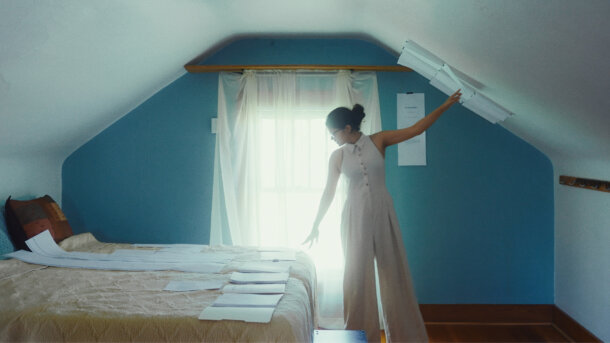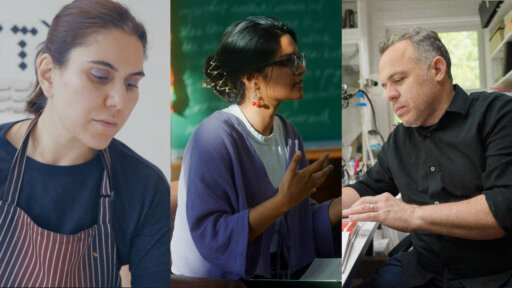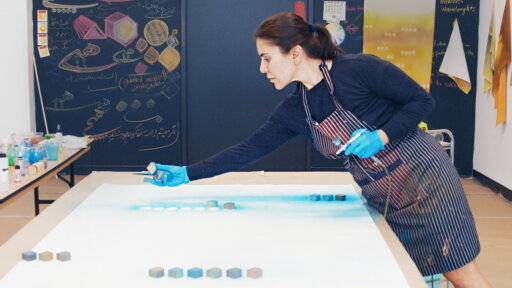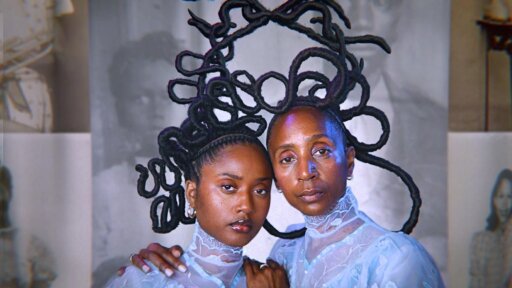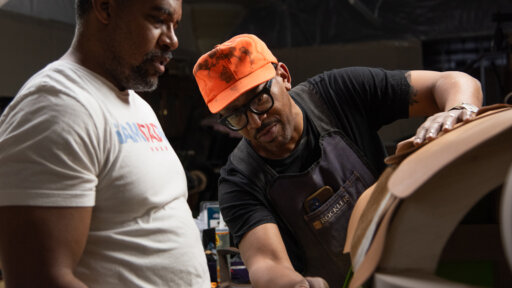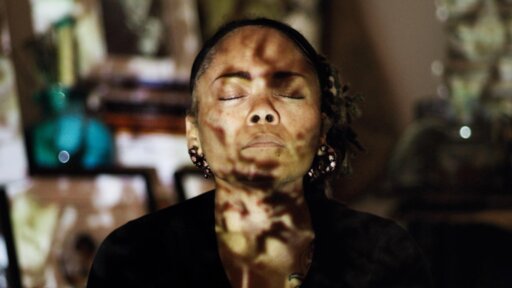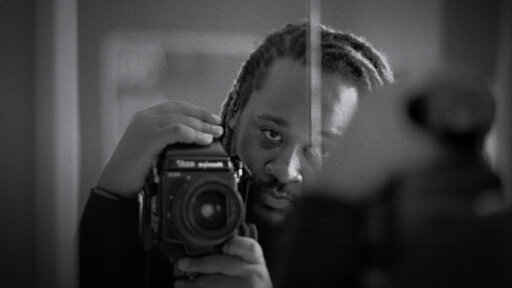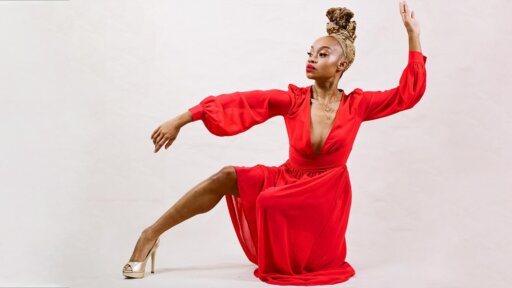TRANSCRIPT
[Whirring] [Stirring music] [Sarah] Somewhere deep within me... is a young person who found the world...unintelligible... ..and overwhelming.
Stories are our way of making meaning of the raw data of being alive.
And what we have on our side is language.
Our ability to construct the house... ..that can hold the truth of what we're trying to say.
[Host] Today, it's my absolute pleasure to be in conversation with Sarah Thankam Mathews, the author of All This Could Be Different.
{an8}Mathews grew up between Oman and India, immigrating to the United States at 17.
All This Could Be Different was a finalist for the National Book Award.
{an8}It was also a New York Times "Editors' Choice" {an8}and named "Best Book of the Year" by NPR, Vogue, Time, and BuzzFeed.
Hi, everyone.
It's lovely to be here.
I'm going to read from the third chapter of my novel, All This Could Be Different.
"Some damp July night, "I walked an hour to a bar I had heard was right.
"I was wearing the make-up from work and a filmy blouse.
"It showed my body's clean lines.
"My hair fell to my collarbone.
"This is how I felt, alone and powerful.
"I crossed towards the girl who just walked in... "a white little face set against dark hair.
"I smiled a wolf smile with my eyes."
[Applause] The beginning spark of All This Could Be Different was in 2020, a year of tumult and chaos and personal reckoning.
And it is the story of this Indian woman who has to reckon with what it means to find home in America.
Should I sign it or make it out to you?
- Oh, to me.
- [Sarah] Okay, perfect.
Hi!
- I'm Sarah, nice to meet you.
- I'm Landis, nice to meet you.
I saw your name and I was like, "Oh, my gosh!"
[Sarah laughs] Thank you so much for that talk, it was so great hearing you speak.
- [Sarah] I'm so glad you liked it.
- So proud of you.
- Thanks for saying... - My God.
So good to see you.
Awesome.
- I'm going to give you another hug.
- Oh, my goodness.
- You should write a sequel.
Well, that's a compliment, for sure.
I just have to say, I love your book.
It made me feel like I can write a novel.
I haven't done it, but it really did.
You look absolutely could write a novel.
Thank you, Sarah, so much.
It was so nice meeting you.
Good luck with the writing.
Keep it up.
[Sarah] As a writer, I am interested in attempting to portray the complex lives of characters who are South Asian, queer, from the Middle East, because these are worlds that I know, and I wish to read myself.
Throughout the last few years, I've been working on a manuscript that could be my second novel.
It's different than my first novel.
It is not set in the US, and I find myself wondering about whether this book will sell or publish well, or whether people will connect with work that is of a place that is not known to them.
It is set exclusively in Oman, in the world I grew up in.
[Contemplative music] The working title is In the Desert.
The process of making has not only been longer than I thought, but much less linear than I thought.
The greatest challenge is this question of memory and perspective.
It became clear to me that if I didn't actively try to remember this place in my life, that I would lose it completely.
So I needed to return to Oman, after 16 years, and... ..do the kind of research that I really needed for my novel.
[Sarah] Experiencing lost place... ..and time... and people.
I was born in South India... ..and, when I was a toddler... my family moved to Muscat, Oman.
{an8}I grew up in the Gulf, {an8}in the background of America's forever wars.
I loved the beach, and I loved the ocean.
We went to the park at night, 'cause it was cooler.
We ate dinner together.
The women cooked.
It felt like such a small place.
[Music continues] [Sarah] But I distinctly remember being driven places... ..and I saw South Asian migrant workers laying the roundabouts, laying brick.
People who I recognised as like my people, who looked exactly like me and my family, making the city that I and other people got to live in.
The cars would circle them and be slow enough that I sometimes would make eye contact with workers.
I could see how hot they were, and they were meaningfully unprotected.
I knew even then.
What I remember... at an emotional level, of that experience, was one of, like, deep shame.
[Music continues] [Sarah] Their legacy... is erased in almost every way.
[Elevator chimes] [Sarah] I want to tell the story of... these two South Asian construction workers... ..who are building a house... and the middle-class Indian family... who live in that house.
I am attempting to write from lived experience, but also reinforced by research and academic work and interviews with real people.
I... feel a tremendous amount of pressure.
What does it mean to do the story justice?
And what do we owe the people who, like, make our worlds possible?
[Music continues] [Indistinct chatter; Music fades] {an8}[Sarah] All This Could Be Different kind of arrived to me {an8}with a really formed voice that I could follow.
And I think, in the early stages of In the Desert, I really struggled to find the right voice, the right container.
Hey, everyone.
So, this is tied to everything we've been talking about all semester.
We are at once architect and actor.
We're on stage.
We're emoting this sort of ongoing idea that voice is a performance, entirely of ourselves, of our own minds, of our own experiences.
But we're also, simultaneously, making the work, planning it, thinking, "This is the house, this is the door."
Ultimately, we get to decide what we want the houses to look like.
The houses that we're building, first of all, for ourselves, but eventually, maybe for other people to walk through.
[Whirring] [Sarah] Thank you all.
[Ruminative music] [Sarah] In my early twenties, I tried to write the book that I thought would be my first novel.
After about seven and a half years, I had to contend with the fact that, while this novel taught me a lot about writing... ..it was not going to be what I wanted it to be.
I just remember reading it, and... that lack of aliveness was very painful to reckon with.
[Music fades] {an8}Oh, my God, look at the view from over there, too.
- It's unreal.
- It's unreal.
How are you feeling?
Cold right now.
Um...
I feel really emotional about the prospect of failure.
I'm trying to write about our old home, this, like... really complex place.
Do you feel like there are times where you... it's like swimming with the current, versus against?
[Sarah] Yeah, totally.
And then thinking about the people who made our lives in Oman possible.
- It's true.
- Like, owing something to someone bigger than myself and bigger than my past self.
[Shireen] Before you... can even get to that point, you have to finish the writing.
I have every confidence in you.
We'll see what happens... but, I really... Oh!
[Playful scream] [Both laugh] [Uplifting music] [Music continues] [Sarah] We are always becoming.
Every project teaches you new things about process, and about the... incompleteness of your own thinking.
There are moments when architect mode and actor mode align, and I feel this sense of breakthrough, wonder, exhilaration.
But ideas are very fragile.
Those moments are the roommates of doubt and a certain pre-emptive worry about foolishness.
[Music continues] [Sarah] I often get asked, "What's next, after All This?"
[Gentle music] [Sarah] I feel like I'm on the right track, But In the Desert, it's not a finished novel, it's a manuscript in progress.
I know that I've done it at least once.
And it really feels like a matter of continuing forward.
That's all I can do.
I could not have written this even a couple of years ago.
I needed to finish my first novel.
I needed to lose a project.
I needed to go back to Oman.
I use the process of putting pages up on the wall as a way of seeing and feeling my own progress.
I just hope this novel, once I complete it, Inshallah... honors my people and honors the places that I'm from.
[Stirring music] [Indistinct whispers emerge] [Sarah] "1999, and the heat is an angry God.
"There is no other way to say it."
[Whispers continue] [Sarah] I write for other South Asian people.
I write for other queer people.
"What lived between them was vivid and small as a desert mouse, "was imperiled in a hundred ways."
I write for people who have lived... ..the journey of migration.
"He would be an old man, "looking over the white city he had helped construct "out of sand and nothing.
But at the center of all the circles...is my younger self.
"Home.
In the desert.
"The ocean within reach.
"Its coolness a miracle."
[Music continues] [Whispers fade] [Sarah] I've waited... so much of my life... to read exactly this.
[Music continues] [Music fades]

